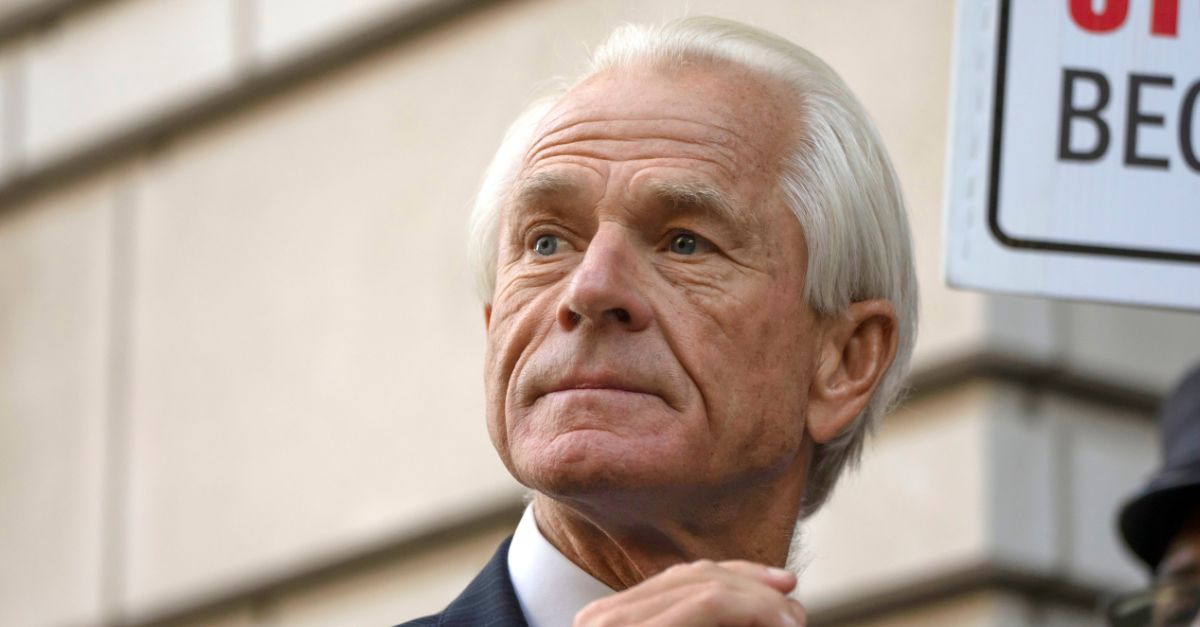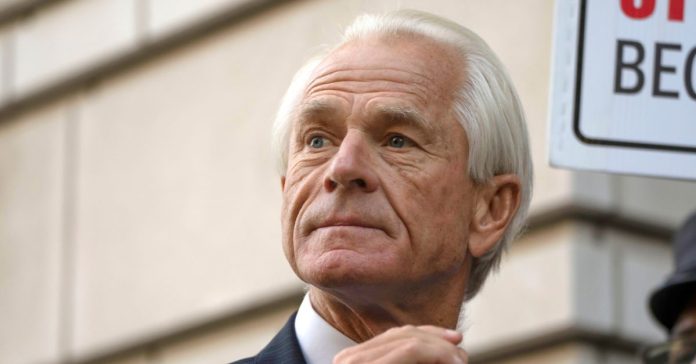
Former White House trade adviser Peter Navarro speaks to the media as he departs federal court in Washington on Tuesday, Sept. 5, 2023. (AP Photo/Mark Schiefelbein)
Former White House trade adviser Peter Navarro, who served under Donald Trump, on Friday asked the U.S. Supreme Court to keep him out of prison while he appeals his contempt of Congress conviction.
On Thursday, a panel on the U.S. Court of Appeals for the District of Columbia denied the defendant that same request — instead ordering him to surrender to federal lockup authorities by March 19.
Navarro’s emergency application, addressed to Chief Justice John Roberts, complains about the appellate court’s ruling by referring to what his attorneys term “the unprecedented nature” of his conviction.
“Dr. Navarro is the only former senior presidential advisor to be prosecuted for contempt of congress following an assertion of executive privilege by the president that advisor served,” the application reads. “To be clear, the District Court found that Dr. Navarro reasonably believed he was obligated to assert executive privilege on behalf of former President Donald Trump and there is no dispute that Dr. Navarro actually asserted executive privilege in response to the congressional subpoena he received.”
The House Select Committee to Investigate the Jan. 6 attack on the U.S. Capitol believed Navarro had key information relevant to the probe on the events leading up to, during and after the pro-Trump riots, prosecutors were able to convince a jury.
When Navarro was asked for such records by Congress, he did not comply voluntarily. When facing the threat of subpoena, he did not comply. When finally under subpoena, he also failed to comply.
An essayed executive privilege defense did not pan out. Trump never supplied Navarro or the court with evidence that he claimed executive privilege over his former trade specialist.
In September 2023, he was found guilty on two counts of contempt of Congress — following a daylong trial and four hours of deliberations.
“For the first time in our nation’s history, a senior presidential advisor has been convicted of contempt of congress after asserting executive privilege over a congressional subpoena,” the emergency application reads. “Dr. Navarro has appealed and will raise a number of issues on appeal that he contends are likely to result in the reversal of his conviction, or a new trial.”
More Law&Crime coverage: The Trump Docket: Judge delays criminal trial in New York for 30 days
In January, U.S. District Judge Amit Mehta sentenced the 74-year-old to four months in prison and a fine of $9,500 for his stonewalling.
In his application, Navarro says the judge did not allow him to present a full defense while allowing the state something like free reign.
From the stay request, at length (emphasis in original):
Moreover, the district court precluded Dr. Navarro from presenting any evidence in his defense explaining that even though he did in fact default on the congressional subpoena, he felt duty-bound to assert executive (the district court acknowledged that Dr. Navarro at the very least thought he had invoked), while simultaneously allowing the government to summarize its case to the jury as Dr. Navarro’s assertion of executive privilege unequivocally did not excuse him from complying with the subpoena and his failure to do so put him, “above the law.”
During the trial, the defense — reeling from pretrial rulings — did not did not call any witnesses or present any evidence.
Navarro’s application argues his prosecution — and the concomitant failure of his privilege defense was a historical aberration.
“Here, it is patently unclear that Congress intended to punish senior presidential advisors who in good faith refused to comply with a congressional subpoena based on a good faith belief they were duty-bound to assert executive privilege — a position the Department of Justice maintained for more than four decades before its pursuit of a prosecution of Dr. Navarro,” the stay request reads.
Brandi Buchman contributed to this report.
Have a tip we should know? [email protected]

